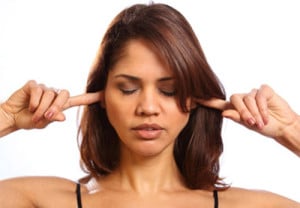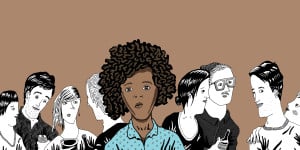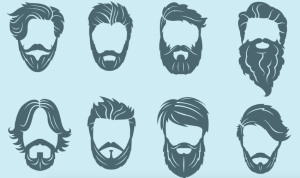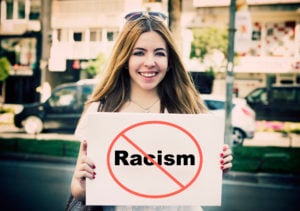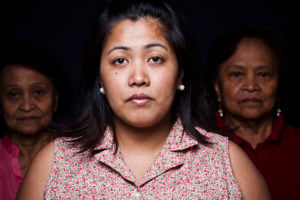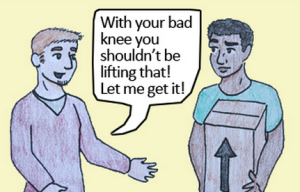
EF
The other day, my brother unearthed some third grade composition book that I haven’t seen in at least a decade. In it, I scribbled out my views on the state of gender roles in America as of November 1999.
“I think a girl’s life is harder than a boy’s life,” I scrawled in crooked cursive. “First of all, girls must learn to do laundry, the dishes, housecleaning, cooking. On the other hand, boys must learn to put on there [sic] tie and be buiseness [sic] men.”
It says a lot about what I noticed in the world around me.
When I was a kid, there was no shortage of picture books depicting men as breadwinners and women as caretakers. On Dexter’s Laboratory, the titular character’s mom plinked around in high heels, an apron, and cleaning gloves, while his dad wore a tie and did something corporate and non-specific. A lot of cartoons were like that.
Though things were different in my home — both of my parents had jobs and chores — I’d still somehow acquired the belief that there was a narrow way to be a “girl” and a narrow way to be a “boy,” and that the “girl” part was somehow harder and less desirable.
But what interests me more than how I first learned these gender roles is the journey it took to reject them.
It was a process of unlearning, one that every person must go through in order to get some distance from the biases, myths, and prejudices that raised them. Because every one of us, no matter how educated our societies or loving our families of origin, makes moral and social judgments based on what we view as “normal.”
These normals can (and should) be unlearned. In fact, a huge number of them need to be unlearned in order for our society to be more objective and just.
For example, in the US, a large number of people are raised to see heterosexuality as the normal sexual orientation. Not entirely surprising — most people happen to be straight.
But it makes less sense when we consider the amount of bullying, violence, hatred, and oppression that has been directed at LGBTQIA+ people in a society that says straight is normal.
Decades of people who were taught to believe that only pairs of men and women could fall in love are having to unlearn that belief for the sake of understanding a more vocal and visible LGBTQIA+ population.
But that’s a fairly obvious example. Not every bias stems from a broad culture. Maybe you grew up in a religious household and ended up questioning your faith. Maybe your parents sheltered you to such a degree that you don’t even know the broader norms.
In any case, we can choose to reject beliefs and behaviors that we find personally limiting or detrimental to humanity as a whole. The seeds of feminism are planted in this unlearning process.
Here are five key steps.
1. Question Everything
Do you remember your why phase? It was probably during a time in your life when you had a lot of first experiences, questions about them, and grownups who supposedly knew the answers.
And so you asked why. Not only why the sky is blue, but maybe also why it’s okay for people to eat chickens and not their friends. There are no ridiculous questions yet because everything is new and ridiculous in the middle of the why phase.
The trouble with this phase was that if someone answered your why question, you had to take their word for it. But now that you’re older, more literate, and capable of accessing the Internet, you can investigate your own questions.
So like a kid asking why pants matter, ask why women are often discouraged for public breastfeeding. Ask why you see topless male joggers every day and think nothing of it. Ask yourself, ask Google, ask scholarly articles, ask your family, ask your cat if it’s patient.
But let yourself have the voice and space to air your questions. You’ll learn new things about yourself and the people around you.
2. Identify Contradictions and Hypocrisy
This is not as easy and comfortable as it sounds on paper. Sometimes, we won’t like what our questions say about us.
I realized earlier this week that I’m hypocritical on the issue of spanking. I’ve failed to question why I simultaneously view spanking as useless and problematic, and also as not a big deal because — as the old excuse goes — “I turned out fine.”
Am I worried about passing judgment on people, including people I’m close to? Do I doubt my own research due to my lack of parenting experience? Is that why my emotional reaction to spanking doesn’t match my cognitive reaction?
There will be times like this when we know full well the answer to a question, but resist coming to a real conclusion. Sometimes that tension doesn’t go away and we have to wrestle with it, and come back to it, and start asking different questions.
Which brings us to another part of the unlearning process.
3. Get Uncomfortable
You won’t have interesting conversations or discoveries in your comfort zone.
Don’t get me wrong — your comfort zone is a perfectly good place to hang out in when you’re enjoying a good novel or relaxing with friends.
But your comfort zone can’t handle you working through your internalized oppression or facing messed up truths about yourself and the world around you. In fact, it doesn’t hurt to actively seek out your own discomfort in manageable doses.
We tend to get uncomfortable when we learn that we’re contributing to a problem, benefiting from privilege, or feeling powerless to effect change. And that discomfort often leads us to avoid reflecting and acting on these parts of our lives, or having important conversations with people.
We can’t afford to avoid all of our discomforts. There will always be someone or something to unsettle us, to remind us that the world is full of injustices that lifetimes of fighting by countless people haven’t eradicated.
4. Self-Examine Carefully
That’s why it’s important to examine the parts of ourselves we least want to own up to. The parts of ourselves that are part of the problem, the parts of ourselves that can be as oppressive as we are oppressed.
A good example of this is learning about and owning up to privileges, or unearned advantages, in society. As a black person, it’s much easier for me to notice other people’s white privilege than it is for me to understand my own class privilege.
Think about an area of your life that you have a moral dilemma around. It could have to do with internalized oppression, sexuality, a form of media that you enjoy, or something problematic that you haven’t let go of.
Pay that area of your life more attention. Don’t leave it unexamined if you truly feel that there’s a moral issue that you need to work out. Ask yourself, “Does this belief or action align with my understanding of the world, or is it just something I was taught?”
5. Rinse, Repeat
We’re constantly collecting new information, talking to like-minded people, confirming and disconfirming our biases, and working to survive in patriarchal cultures.
This means that the unlearning process is ongoing and lifelong.
So even though you now have more control over where and how you get your information, keep questioning it and examining your discomfort with it, and check in with yourself to be sure you’re thinking deliberately rather than reactively.
You can also seek and accept help from family members, friends, therapists, counselors, social workers, and others who can help you overcome deeply ingrained beliefs and traumas.
It’s a never-ending process; but it’s worth it.
[do_widget id=”text-101″]
Jarune Uwujaren is a Contributing Writer for Everyday Feminism. A Nigerian-American recent graduate who’s stumbling towards a career in writing, Jarune can currently be found drifting around the DC metro area with a phone or a laptop nearby. When not writing for fun or profit, Jarune enjoys food, fresh air, good books, drawing, poetry, and sci-fi. Read their articles here.
Search our 3000+ articles!
Read our articles about:
Our online racial justice training
Used by hundreds of universities, non-profits, and businesses.
Click to learn more






